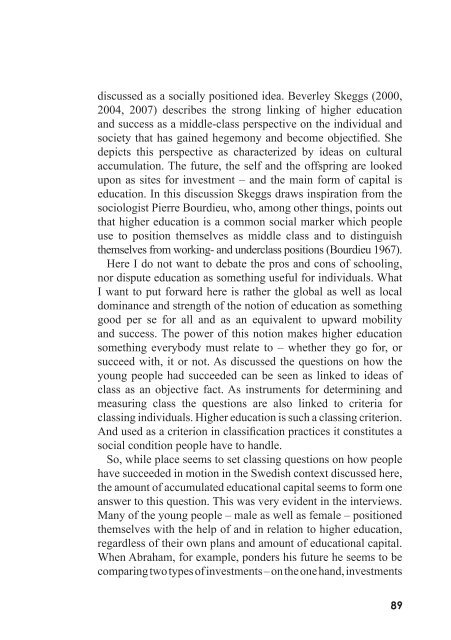Thinking with Bevereley Skeggs - Stockholms universitet
Thinking with Bevereley Skeggs - Stockholms universitet
Thinking with Bevereley Skeggs - Stockholms universitet
- No tags were found...
You also want an ePaper? Increase the reach of your titles
YUMPU automatically turns print PDFs into web optimized ePapers that Google loves.
discussed as a socially positioned idea. Beverley <strong>Skeggs</strong> (2000,2004, 2007) describes the strong linking of higher educationand success as a middle-class perspective on the individual andsociety that has gained hegemony and become objectified. Shedepicts this perspective as characterized by ideas on culturalaccumulation. The future, the self and the offspring are lookedupon as sites for investment – and the main form of capital iseducation. In this discussion <strong>Skeggs</strong> draws inspiration from thesociologist Pierre Bourdieu, who, among other things, points outthat higher education is a common social marker which peopleuse to position themselves as middle class and to distinguishthemselves from working- and underclass positions (Bourdieu 1967).Here I do not want to debate the pros and cons of schooling,nor dispute education as something useful for individuals. WhatI want to put forward here is rather the global as well as localdominance and strength of the notion of education as somethinggood per se for all and as an equivalent to upward mobilityand success. The power of this notion makes higher educationsomething everybody must relate to – whether they go for, orsucceed <strong>with</strong>, it or not. As discussed the questions on how theyoung people had succeeded can be seen as linked to ideas ofclass as an objective fact. As instruments for determining andmeasuring class the questions are also linked to criteria forclassing individuals. Higher education is such a classing criterion.And used as a criterion in classification practices it constitutes asocial condition people have to handle.So, while place seems to set classing questions on how peoplehave succeeded in motion in the Swedish context discussed here,the amount of accumulated educational capital seems to form oneanswer to this question. This was very evident in the interviews.Many of the young people – male as well as female – positionedthemselves <strong>with</strong> the help of and in relation to higher education,regardless of their own plans and amount of educational capital.When Abraham, for example, ponders his future he seems to becomparing two types of investments – on the one hand, investments89
















